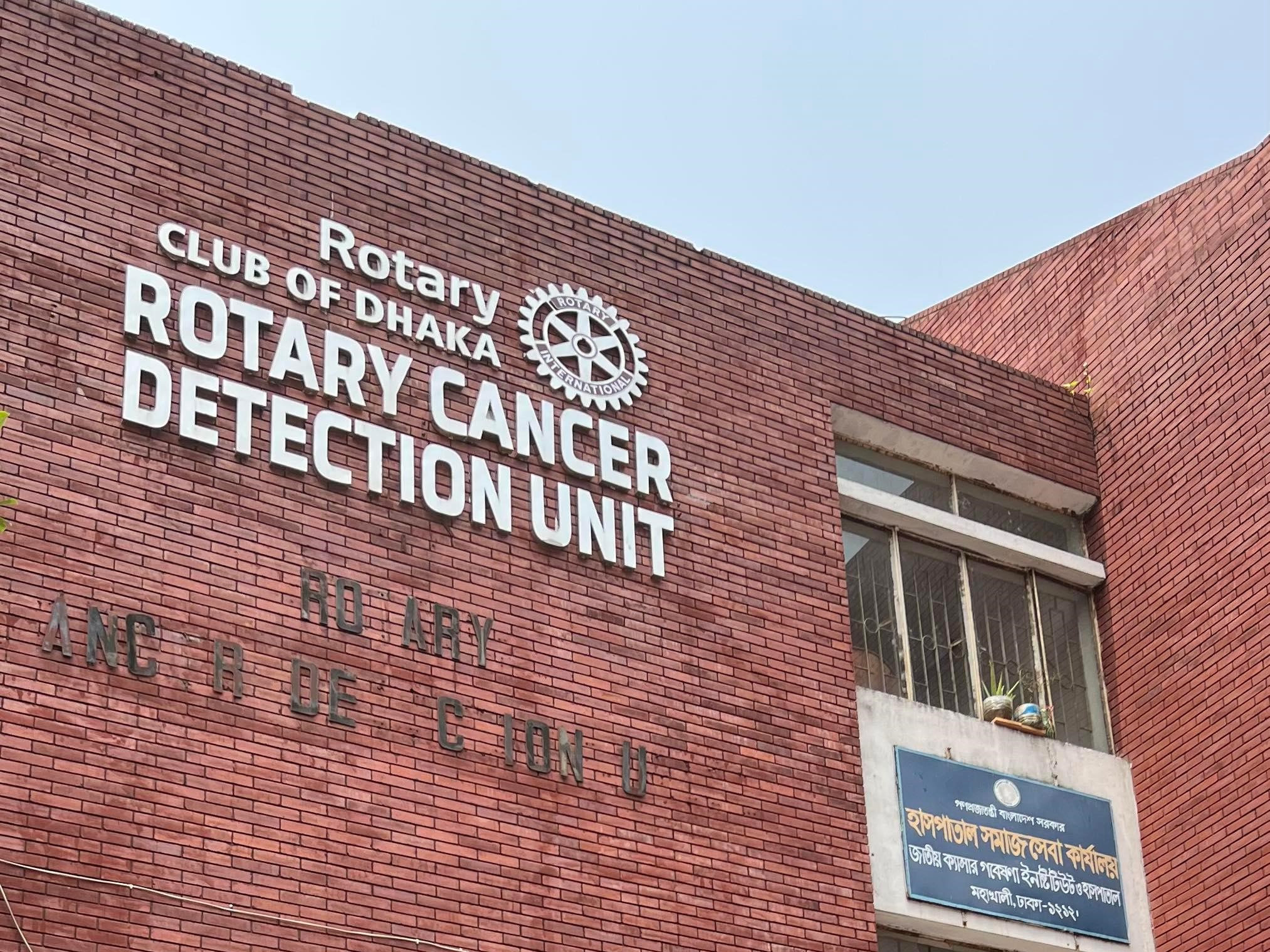
Bangladesh, currently classified by the UN as a Least Developed Country (1), has one national cancer hospital – the National Institute of Cancer Research & Hospital (NICRH) – based in Mohakali in the capital City, Dhaka.
Patients are referred to this hospital from around the country – but many of these patients are uneducated and live a largely rural or semi-rural life and have long distances to travel. Such travel to Dhaka for treatment is particularly hard as many are very poor: there are the costs of bus or train and accommodation for themselves and family caregivers to consider. (These patients are unable to afford the healthcare that is available to wealthier patients through Bangladesh’s burgeoning private health sector.)
Regular readers will remember that during the Covid-19 pandemic we were able to partner (along with other Clubs from the USA and Australia) in a Global Grant application by the Rotary Club of Dhaka to set up a Covid-19 lab in the hospital. Patients need to have a negative Covid-19 test result before they can be admitted for any sort of cancer treatment. Prior to establishing the Covid-19 testing lab, patients needed to get the test done at another facility. This was putting an additional burden on already sick patients. Setting up the Covid-19 testing lab meant that the testing could be done on site.
Following approval for a District Grant from our Rotary District (1120) and subsequently a Global Grant from The Rotary Foundation, the lab was built and equipment purchased. It received certification in 2021. Since then, the lab has tested many thousands of patients, allowing them to proceed for vital cancer treatment and, literally, helping to save lives.
While on holiday in Bangladesh one of our Members, Rotarian Julie Reza, had the opportunity to visit the RT-PCR lab at the hospital’s Cancer Detection Unit (also set up by the Rotary Club of Dhaka in the 1980s).
Julie, an immunologist by training, was shown around the site by the Dhaka club’s PP Major (Retd) Khandker Badrul Hasan and was accompanied by Dhaka Rotarian Syeda Gulru Hasan. She was able to see, with her own eyes, cancer patients waiting for treatment at the hospital.
She was introduced to Dr Sufi HZ Rahman who is Associate Professor in the Dept of Immunology and Molecular Biology, and who oversees the running of the Covid-19 Lab.
Julie was pleased to see how the equipment was being used and to learn of the standard operating processes established by the lab to ensure biosafety and general safe handling of materials.
While there, Julie learned that of the testing that had been done that day, there were zero cases of Covid-19. This fits with the lab’s view that Covid-19 cases are declining. As planned from the outset, the lab, which uses the advance molecular biology technique of RT-PCR, is now switching to cancer screening activities. Additional funds previously sent by our Club for use in the lab has helped fund some of the reagents and equipment needed for this switch.
Julie also met Rotarian Dr Farida Arjuman, who Is associate Professor and Head of the Dept of Histopathology. Dr Arjuman showed Julie around the histopathology lab (which has also received Rotary support) and told Julie about her research that has been funded by the Rotary Club of Dhaka. The research findings will help add to the body of evidence about the diagnosis of cancer (particularly gastric cancer) and may help towards developing new diagnostics in the future.
“It’s a great pleasure to be shown around the facility and to see the dedication of the lab staff to their work. I’m delighted to see the impact that Rotary has had on the diagnosis and treatment of cancer in Bangladesh – and their interest in supporting research as well. This all goes to highlight how Rotary can make a genuine difference to the welfare of so many,” said Julie.
However, while being shown around the facility Julie was sorry to hear that the hospital is currently unable to offer radiotherapy due to a problem with the equipment. While the hospital receives public funds, these do not always meet needs. When she asked what treatment is currently being offered to the patients, she learned the lack of a radiotherapy option meant clinicians could only offer cancer patients chemotherapy or palliative care. Knowing that timely radiotherapy can save lives, Julie was heartened to hear that the Rotary Club of Dhaka is aware of this problem and is making efforts to fix this issue.
Picture: The Rotary Cancer Detection Unit in which the Covid-testing lab is based. Picture credit: Rotary Club of Dhaka.


